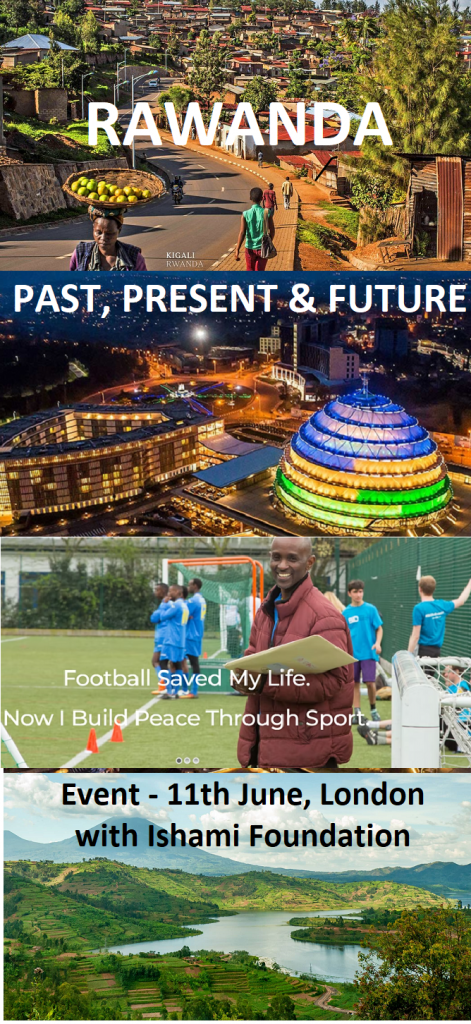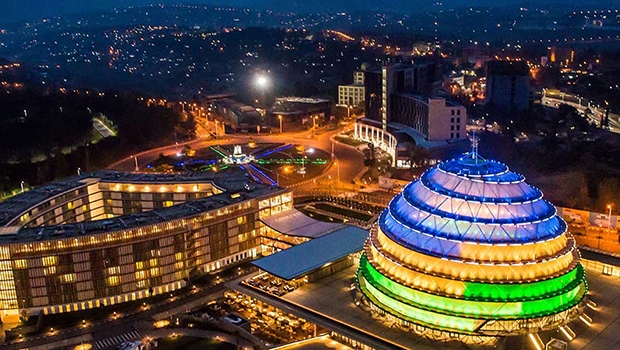Rwanda – Past. Present & Future. Fundraising Event for the continued Promotion of Peace and Tolerance in Society.

With Rwanda featuring in the British news UK recently – on Saturday 11th June, we take a look behind the hype at the country from the perspective of it’s own people.
About this event
At this event, we will be introducing special guest speaker – Eric Murangwa Eugene MBE who is the Chief Executive Officer and Co-Founder of Ishami Foundation.
The past – A reflection 30 years after the 1994 Genocide against the Tutsi in Rwanda.
Research was conducted by the Rwandan Ministry of Local Government in 2002. This research revealed that 1,074,017 people were killed during the Genocide, of whom 93.7% were Tutsi.
We cannot forget, and we cannot ever let this happen again, anywhere in the world. Here are Rwandans making a difference.
Attend event (free tickets)
The Present – Taking stock
An examination at what Rwanda has achieved in recent years. Peace, Reconciliation, Women Empowerment, Economic and Business Success.
Rwanda’s financial sector is stable, well-capitalized, profitable, and liquid. The sector consists of a vast and growing array of institutions, a stock exchange, Banks, microfinance institutions, savings and credit cooperatives (SACCOs), insurance companies, and pension funds and is becoming increasingly diversified.
Tourism is building in the country. Known as the land of a thousand hills, Rwanda’s stunning scenery and warm, friendly people offer unique experiences in one of the most remarkable countries in the world. It is blessed with extraordinary biodiversity, with incredible wildlife living throughout its volcanoes, montane rainforest and sweeping plains.
The Kigali Convention Centre offers a premium environment for regional and international conventions, exhibitions, festivals, meetings and other events.
Rwanda’s garment-textile exports grew by 83% in 2 years
Rwanda Literacy Rate 1978-2022 is 73.22%. While taking into consideration Rwanda’s income level, the nation is achieving 94.7% of what should be possible based on its resources (income) for primary education but only 51.6% for secondary education. Source: Human Rights Measurement Initiative.
As of 2021, the African country Rwanda ranks in the top seven countries for gender equality according to the Global Gender Gap Report. The Rwandan government is committed to ensuring equal rights for women and men without prejudice to the principles of gender equality and complementarity in national development. In that same list, 27th is the United Kingdom and the United States is 30th.
The Future – Is the future bright for Rwanda?
In line with National Strategy for Transformation (NST1) 2017-2024, the industrial policy prioritizes inclusive economic growth, job creation, and private sector-led development with a focus on high-value intensive agriculture and agro-processing, manufacturing, tourism, and knowledge-based services and ICT.
Rwanda is pioneering renewable technologies, with a methane gas plant on Lake Kivu suppling 14% of our energy requirements, and a growing solar sector.
The country is among the top three African countries in terms of internet connectivity, with an ever-growing fibre optic network. Rwanda has an excellent mobile phone network covering almost the entire country, and international calls can be made easily.
***************************************
Please Donate towards the work of the Ishami Foundation.
What does the Ishami Foundation do?
1. The Ishami Foundation connects schools with survivors of the 1994 genocide against the Tutsi in Rwanda who can provide talks or workshops tailored to their needs.
2. Workshops seek to strengthen young people’s resistance to divisive rhetoric and radicalisation by helping them to recognise the processes that lead to prejudice, extremism and identity-based hatred.
3. Ishami Foundation has been running football for social cohesion programmes in the UK since 2014.
Play2Remember is an annual football tournament with a social goal to remember genocide victims and stand with survivors while promoting reconciliation and togetherness through sport.
4. Ishami Foundation uses the power of football to encourage teamwork, develop conflict prevention skills and fight prejudice, intolerance and hatred in the community.
5. The 100 Stories project. Focussing on moments of transformation and reflection, the stories explore a range of perspectives: those of survivors, of Tutsis outside of the country in 1994, of bystanders, perpetrators and visitors to Rwanda.
**************************************************
This event is a collaboration between the Ishami Foundation, the Conservative Friends of East Africa and Black Economics.
The date of this event is in the middle of the official international memorial period of the dark period in Rwandan History.
On April 7th, every year, is a key memorial date in the calendar. This date marks the beginning of the national mourning period that lasts until July 4th and Liberation Day, a day set aside to celebrate the day Rwanda Patriotic Front brought to an end the 1994 Genocide against the Tutsi.
In 2003, a United Nations General Assembly adopted a resolution establishing the International Day of Reflection on the 1994 Genocide in Rwanda on April 7th. In January 2018, the day was renamed as International Day of Reflection on the 1994 Genocide against the Tutsi in Rwanda.
Present and Future
Speakers include – Lucien-Martial Godo, Ruth Barry, Lord Rayner and the High Commissioner of Rwanda – Johnston Busingye.
Conversational Interview :
- Eric Murangwa Eugene MBE
Hosted by Dr Victoria Showunmi
Date and time
Sat, 11 June 2022, 10:30 – 1pm BST
Venue
Lansdowne House, 9 Fitzmaurice Place, Mayfair, London, W1J 5JD









